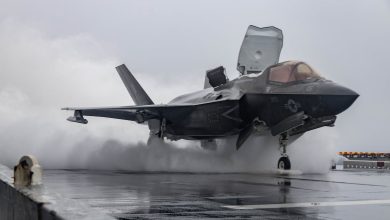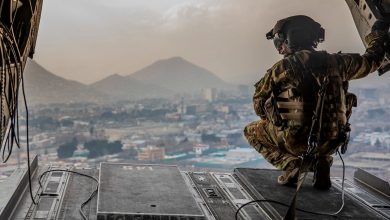US to boost military presence in Middle East amid growing tensions
:quality(70)/cloudfront-us-east-1.images.arcpublishing.com/archetype/KTHLKFNKB5H5HKIYUF4CG57E5Y.jpg?w=780&resize=780,470&ssl=1)
The U.S. Defense Department will move a fighter jet squadron to the Middle East and maintain an aircraft carrier in the region, the Pentagon said Friday, as President Joe Biden made good on his promise to beef up the American military presence to help defend Israel from possible attacks by Iran and its proxies and safeguard U.S. troops.
In a statement, the department said Defense Secretary Lloyd Austin also ordered additional ballistic missile defense-capable cruisers and destroyers to the European and Middle East regions and is taking steps to send more land-based ballistic missile defense weapons there.
The shifts come as U.S. leaders worry about escalating violence in the Middle East in response to recent attacks by Israel on Hamas and Hezbollah leaders, which triggered threats of retaliation.
Biden in a call Thursday afternoon with Israeli Prime Minister Benjamin Netanyahu discussed new U.S. military deployments to protect against possible attacks from ballistic missiles and drones, according to the White House. In April, U.S. forces intercepted dozens of missiles and drones fired by Iran against Israel and helped down nearly all of them.
The assassinations of Hamas leader Ismail Haniyeh in Tehran on Wednesday and senior Hezbollah commander Fouad Shukur in Beirut on Tuesday risk escalating the fighting into an all-out regional war, with Iran also threatening to respond after the attack on its territory. Israel has vowed to kill Hamas leaders over the group’s Oct. 7 attack, which sparked the war.
Austin is ordering the Abraham Lincoln aircraft carrier strike group to the Middle East to replace the Theodore Roosevelt carrier strike group, which is in the Gulf of Oman but scheduled to come home later this summer. That decision suggests the Pentagon has decided to keep a carrier consistently in the region as a deterrent against Iran at least until next year.
The Pentagon did not say where the fighter jet squadron was coming from or where it would be based in the Middle East. A number of allies in the region are often willing to base U.S. military forces but don’t want it made public.
The White House in a statement said Biden “reaffirmed his commitment to Israel’s security against all threats from Iran, including its proxy terrorist groups Hamas, Hezbollah and the Houthis.”
Earlier Friday, Sabrina Singh, Pentagon spokeswoman, told reporters that moves were in the works. She said Austin “will be directing multiple” force movements to provide additional support to Israel and increase protection for U.S. troops in the region.
Military and defense officials have been considering a wide array of options, from additional ships and fighter aircraft squadrons to added air defense systems or unmanned assets. In many cases, the U.S. does not provide details because host nations are very sensitive about the presence of additional U.S. forces and don’t want those movements made public.
It’s unclear what new ships would move to the Middle East.
The U.S. has had a consistent warship presence there and in the eastern Mediterranean Sea, including two Navy destroyers, the Roosevelt and the Bulkeley, as well as the Wasp and the New York. The Wasp and the New York are part of the amphibious ready group and carry a Marine expeditionary unit that could be used if any evacuation of U.S. personnel is required.
In addition, a U.S. official said that two U.S Navy destroyers that are currently in the Middle East will be heading north up the Red Sea toward the Mediterranean Sea. At least one of those could linger in the Mediterranean if needed. The official spoke on condition of anonymity to discuss troop movements.
Tara Copp is a Pentagon correspondent for the Associated Press. She was previously Pentagon bureau chief for Sightline Media Group.
Read the full article here







